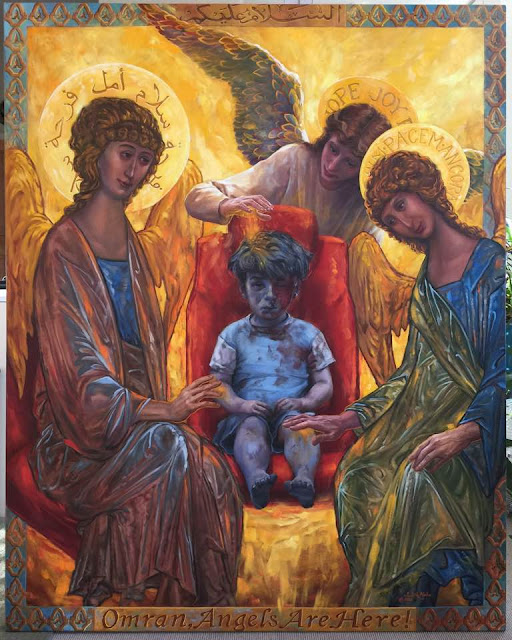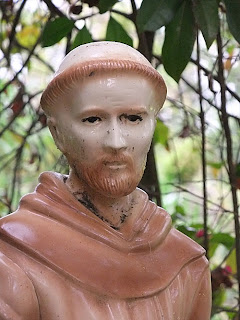Mary of Aleppo
Every year some part of the Jesus birth narrative strikes me differently. For the past few years, it has been that the birth wasn't a pretty, sanitized thing, but was full of dirt and muck and loneliness. The song, "Labor of Love" by Andrew Peterson, has been my song of the season in the past.
This year it is Mary's Magnificat that has captured and held my attention. I've read a couple of articles about how Mary was not meek and mild but that she was a revolutionary, a rebel against the occupation.
I'm sure you've seen the video footage coming out of Aleppo. I watched one yesterday that started with a shell-shocked child sitting on a gurney, like so many of the shell-shocked Syrian children we've seen lately. Blood is on his forehead. Beside him was a woman from the same building that had been bombed. She is mourning and crying for her lost children. Her face is bloodied also.
The camera moves to a teenage boy standing in the door way. He's holding a baby, cradling it, a baby that has suffocated in the collapsed building. He is the last of his family.
The camera returns to the boy, his baby brother wrapped and on his lap. He is sitting next to the mourning woman.
The teenaged boy pats her on the shoulder and says, "It's okay, God will avenge us against the oppressor."
I think: you're going to get yourself killed.
And it hits me. That's Mary.
It's a gut reaction it is backed up by history.
Nazareth is one mile from Sepphoris, which in 4 BCE (per Josephus) was sacked by Judas ben Ezekias in a revolt against Herodian rule. (This was after Herod the Great.) [Josephus, Antiquities of the Jews] The Roman governor of Syria burnt down the city and sold its inhabitant into slavery. That last is probably hyperbole on Josephus' part. Archaeologists have not been able to find traces of burning. But the governor of Syria surely responded to put down a rebellion. [Josephus, Wars of the Jews]
Mary lived through that. In her village of Nazareth, one mile away, although later tradition also has her growing up in Sepphoris.
One mile from Aleppo would be close enough. She would say "God will avenge us."
It is my hope, that as Mary gave birth, and witnessed all the wondrous events surrounding the birth of her son that as she pondered things in her heart, she realized God had bigger plans than mere revenge, that she had given birth to the Savior, not just of her corner of the earth, but of the world.
But this story has not finished working itself on me and I have perhaps tied too neat a bow onto the end of it.
Mary of Aleppo, hear our prayer and save your people.
[Video link for the last hospital in Aleppo: the images are "upsetting" as the very British news announcer put it.]
[Video link for the song "Labor of Love"]
This year it is Mary's Magnificat that has captured and held my attention. I've read a couple of articles about how Mary was not meek and mild but that she was a revolutionary, a rebel against the occupation.
I'm sure you've seen the video footage coming out of Aleppo. I watched one yesterday that started with a shell-shocked child sitting on a gurney, like so many of the shell-shocked Syrian children we've seen lately. Blood is on his forehead. Beside him was a woman from the same building that had been bombed. She is mourning and crying for her lost children. Her face is bloodied also.
 |
| "Omran, Angels Are Here!" by Judith Behr |
The camera returns to the boy, his baby brother wrapped and on his lap. He is sitting next to the mourning woman.
The teenaged boy pats her on the shoulder and says, "It's okay, God will avenge us against the oppressor."
I think: you're going to get yourself killed.
And it hits me. That's Mary.
He has brought down rulers from their thrones(from the Magnificat, Luke 1:52-53).
but has lifted up the humble.
He has filled the hungry with good things
but has sent the rich away empty.
It's a gut reaction it is backed up by history.
Nazareth is one mile from Sepphoris, which in 4 BCE (per Josephus) was sacked by Judas ben Ezekias in a revolt against Herodian rule. (This was after Herod the Great.) [Josephus, Antiquities of the Jews] The Roman governor of Syria burnt down the city and sold its inhabitant into slavery. That last is probably hyperbole on Josephus' part. Archaeologists have not been able to find traces of burning. But the governor of Syria surely responded to put down a rebellion. [Josephus, Wars of the Jews]
Mary lived through that. In her village of Nazareth, one mile away, although later tradition also has her growing up in Sepphoris.
One mile from Aleppo would be close enough. She would say "God will avenge us."
It is my hope, that as Mary gave birth, and witnessed all the wondrous events surrounding the birth of her son that as she pondered things in her heart, she realized God had bigger plans than mere revenge, that she had given birth to the Savior, not just of her corner of the earth, but of the world.
But this story has not finished working itself on me and I have perhaps tied too neat a bow onto the end of it.
Mary of Aleppo, hear our prayer and save your people.
[Video link for the last hospital in Aleppo: the images are "upsetting" as the very British news announcer put it.]
[Video link for the song "Labor of Love"]


Comments
Post a Comment
Thank you for taking the time to leave a comment.